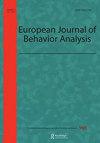Disrupting delayed matching-to-sample performance with varied distractor tasks
引用次数: 0
Abstract
ABSTRACTExplanations of delayed stimulus control (e.g., delayed matching-to-sample, sequencing stimuli under the control of spoken instructions) and other instances of joint control often rely on “mediating” behavior, typically echoic responses occurring throughout the delay, to explain how stimuli no longer present can control behavior. While covert mediation itself cannot be observed, several researchers have looked at different procedures that disrupt potential performance by “blocking” presumed covert mediation by engaging in unrelated overt verbal behavior to tell us more about the nature of this putative mediation. In this study, preschool-aged children were taught to tact pictures of familiar objects and select them from an array of eight. During delayed matching-to-sample (DMTS) trials, participants were required to either talk to the experimenter, look at distractor pictures, or match figures using a tangram toy. The type of “blocking” activity during the delay was manipulated in a test-retest multiple treatment design, and the resulting DMTS performance was compared. With some individual differences, the distractor task assumedly most incompatible with covert verbal rehearsal, a conversational interview, was the least disruptive to performance. These data suggest refraining from assuming performance reductions during “blocking” are caused by incompatibility with covert mediation.KEYWORDS: Covert behaviorprivate eventsjoint controldelayed matching-to-sampleverbal behaviormediation Disclosure statementNo potential conflict of interest was reported by the author(s).Compliance with ethical standardsThe authors have no known conflicts of interest. This study’s procedures were reviewed and approved by the Institutional Review Board for Human Subjects Research at our institution and have been performed in accordance with the ethical standards as laid down in the 1964 Declaration of Helsinki and its later amendments. All participants assented to the study and their parent/guardian gave their informed consent.干扰延迟匹配样本性能与不同的分心任务
延迟刺激控制的解释(例如,语音指令控制下的延迟匹配样本,顺序刺激)和其他联合控制的实例通常依赖于“中介”行为,通常是在整个延迟中发生的回声反应,来解释不再存在的刺激如何控制行为。虽然隐蔽调解本身无法被观察到,但一些研究人员已经研究了不同的程序,这些程序通过参与不相关的公开语言行为来“阻止”假定的隐蔽调解,从而破坏潜在的表现,从而告诉我们更多关于这种假定调解的性质。在这项研究中,学龄前儿童被教导触摸熟悉物体的图片,并从一组八张图片中选择它们。在延迟匹配样本(DMTS)试验中,参与者被要求与实验人员交谈,看分心图片,或使用七合板玩具匹配数字。在测试-再测试多重处理设计中,对延迟期间的“阻断”活动类型进行了控制,并比较了结果DMTS的性能。尽管存在一些个体差异,但被认为与隐蔽的口头排练最不相容的分心任务,即对话式面试,对表现的破坏性最小。这些数据表明,不要假设“阻塞”期间的性能下降是由于与隐蔽中介不兼容造成的。关键词:隐蔽行为;私人事件;联合控制;延迟匹配样本;言语行为;符合道德标准作者没有已知的利益冲突。本研究的程序由我们机构的人体受试者研究机构审查委员会审查和批准,并按照1964年赫尔辛基宣言及其后来的修正案中规定的道德标准进行。所有的参与者都同意这项研究,他们的父母/监护人也给予了他们的知情同意。
本文章由计算机程序翻译,如有差异,请以英文原文为准。
求助全文
约1分钟内获得全文
求助全文

 求助内容:
求助内容: 应助结果提醒方式:
应助结果提醒方式:


